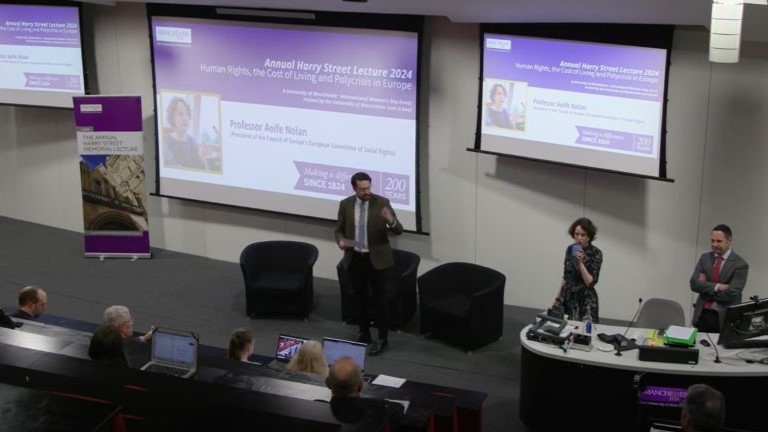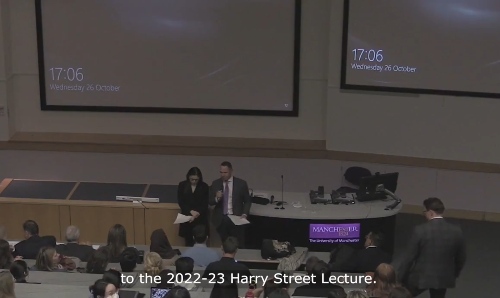The Harry Street Lecture Series
The Annual Harry Street Lecture takes place each year. Harry Street was a well-known British jurist and legal scholar, who spent much of his life at the University of Manchester.
The Harry Street Lecture has run every year (with few exceptions) since 1985 and has been given by an impressive roll call of leading figures from the worlds of law and politics.
More information about Harry Street’s life and career is available at this link.
2024/2025 (37) Professor David Bilchitz (Acting Justice of the Constitutional Court of South Africa)
2024/2025 (37) Professor David Bilchitz (Acting Justice of the Constitutional Court of South Africa)
In 2024, the National Institute for Health Care and Excellence (NICE) decided that a life-saving breast cancer drug Enhertu could not be made available on the NHS in England and Wales, largely due to the high price being charged by pharmaceutical corporations.
Much of the subsequent outcry in the media has been focused on government’s obligations to ensure access to life-saving drugs. Yet very little discussion has been focused on the obligations of pharmaceutical companies to make such life-saving drugs available at an affordable price.
This lecture will consider the question of whether corporations have positive obligations to take active steps to assist in the realisation of fundamental rights, and, if they do, how to determine the extent of their obligations.
First, I will consider the case for recognising that corporations have positive obligations. I will provide reasons for rejecting the position in existing international frameworks such as the United Nations Guiding Principles on Business and Human Rights which confine corporate obligations to those involved in avoiding harm to fundamental rights.
Secondly, I will turn to consider how to determine the substantive content and extent of those obligations. I will provide an analytical framework for addressing this question which involves multiple factors and a decision-making procedure for reaching a final determination. Throughout, I will use the example of access to life-saving medications by pharmaceutical manufacturers to illustrate the approach.
Lastly, I consider how a recognition of positive obligations of corporations can practically be enshrined in law. I evaluate a promising approach adopted in India requiring corporations to spend 2% of their net profits on contribution to social projects and demonstrate, how suitably modified, such an approach can be harnessed to ensure corporations play their part in helping to realise our most basic of rights.
2023/2024 (36) Professor Aoife Nolan (President of the Council of Europe's European Committee of Social Rights)
2023/2024 (36) Professor Aoife Nolan (President of the Council of Europe's European Committee of Social Rights), Human Rights, the Cost of Living and Polycrisis in Europe
Since 2022, Europe has faced a cost of living crisis, with high inflation and associated rising prices and reduced household incomes having a particularly severe impact on those who were already at the sharp end of European society.
Far from being a merely short-term, freestanding social and economic ‘blip’ that will be solved by a drop in inflation, the cost-of-living crisis forms part of a polycrisis; it constitutes the most chronologically recent element of the series of financial, economic, health and conflict-related shocks that have buffeted the most socially vulnerable across Europe over the last two decades.
This lecture focuses on what the cost of living crisis and the broader polycrisis mean for human rights standards, mechanisms and effectiveness in Europe. What role should human rights play In a present and future of polycrisis – and how can this be ensured?
2022/2023 (35): Nazir Afzal (Chancellor, University of Manchester), Why the Current Justice System is Broken
Nazir Afzal is one of the UK’s leading advocates for social justice and spent many years with the CP. He later joined the Association of Police and Crime Commission (leaving to comment more freely on the Manchester Arena Bombing) and the Independent Press Standards Organisation. Throughout his career he has doggedly fought for the rights of women and children, especially those from minority ethnic and religious backgrounds, but has been a voice for the vulnerable more generally. He has been outspoken on forced marriage, honour killings and female genital mutilation.
From his own early experiences of racism and bullying onwards, Nazir understood that the criminal justice system, functioned to marginalise and exclude certain groups of people. He also rapidly came to perceive that both the problems and solutions were nuanced and complex, a reality that he would dramatically confront when prosecuting the Rochdale Child Sexual Exploitation cases.
Nazir is also the independent Chair of the Catholic Church’s Safeguarding Agency and is currently conducting an independent review of the culture of London Fire Brigade for the Mayor of London.
His talk engaged with the question of why the current justice system is broken, as well as the legacy of Rochdale. What can we do to make all citizens truly equal before the law, regardless of age, gender, class, ethnicity, sexuality, religion, or culture?
2020/2021 (34): Professor Alison Young, UK Constitutional Reform – Westminster or Whitehall?
We’re often told that there is no real understanding of the separation of powers in the UK constitution. Its efficient secret is the fusion of the executive and the legislature, combined with the independence of the judiciary.
Yet, this misunderstands the extent to which the UK constitution rests on a delicate balance of powers between Parliament, the Government and the courts. As the UK constitution evolves, the balance between Parliament and the Government – between Westminster and Whitehall – fluctuates.
The Conservative Party’s 2019 general election manifesto promised to establish a Commission on the Constitution, Democracy and Rights, as well as repealing the Fixed-term Parliaments Act 2011. Both the Independent Review of Administrative Law and the Independent Human Rights Act Review have asked whether the UK constitution currently gives too much power to the courts.
This lecture will argue that, in doing so, these reviews fail to tackle a deeper problem. The lecture will ask whether the real problem is a tipping of the balance of power away from Westminster towards Whitehall and asks whether this is a move in the right direction'.
Alison Young is the Sir David Williams Professor of Public Law at the University of Cambridge and a Fellow of Robinson College. She researches in all aspects of public law and constitutional theory, focusing recently in particular on the implications of Brexit on the UK constitution.
She has published two monographs, Parliamentary Sovereignty and the Human Rights Act and Democratic Dialogue and the Constitution and has just finished updating the most recent edition of Turpin and Tomkins: British Government and the Constitution. She also co-edits the UKCLA blog, is a trustee of the Constitution Society and the Director of the Cambridge Centre for Public Law.’
2019/2020 (33): Andy Burnham, Manchester and the North of England
The 2019-2020 Harry Street Lecture, titled Manchester and the North of England, was delivered by the Mayor of Greater Manchester Andy Burnham.
2018/2019 (32): Lucy Powell MP, The Role and Functions of MPs in the UK
The 2018-2019 Harry Street Lecture, titled The Role and Functions of MPs in the UK, was delivered by Lucy Powell MP.
- More information about the previous Harry Street Lectures are available here.


